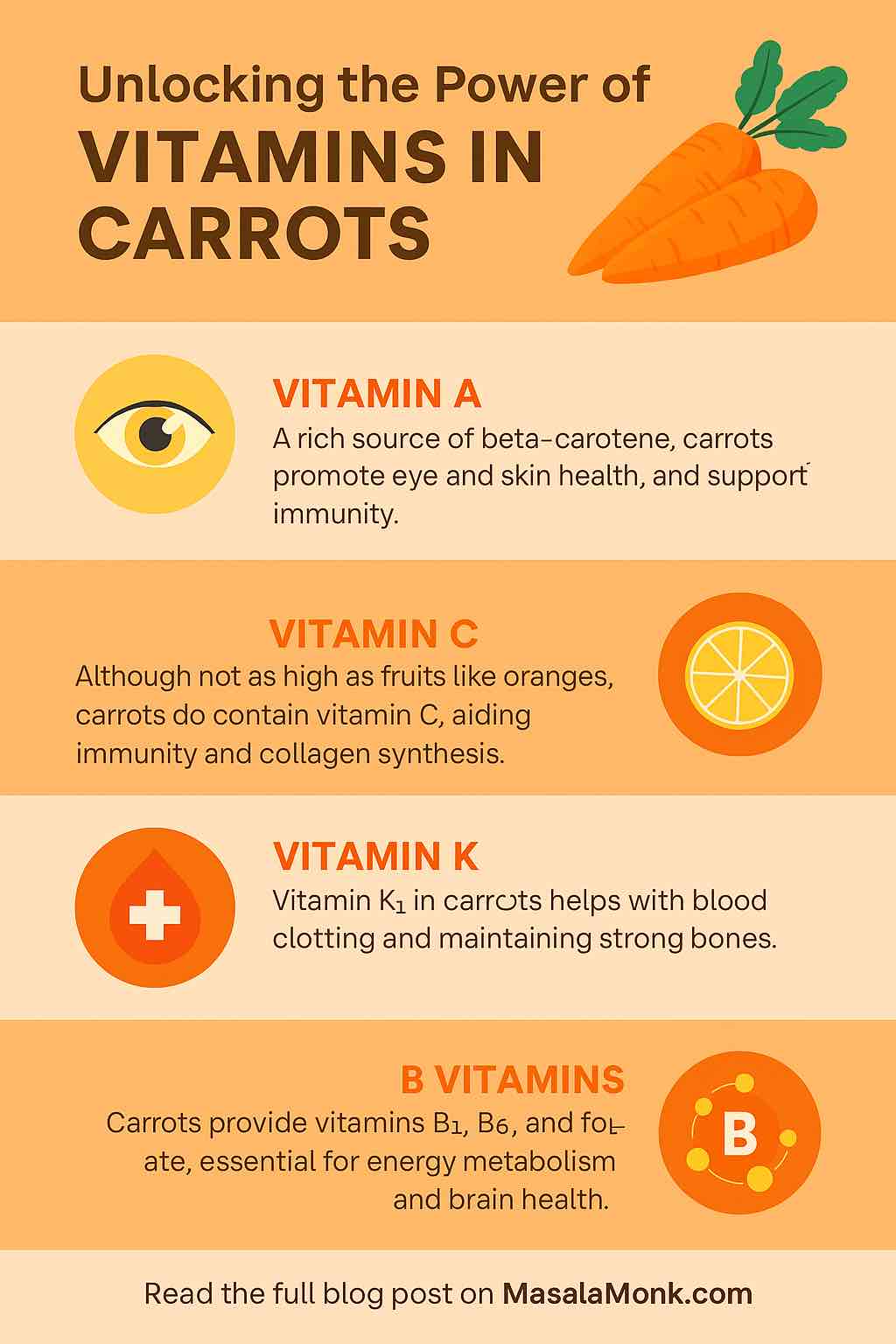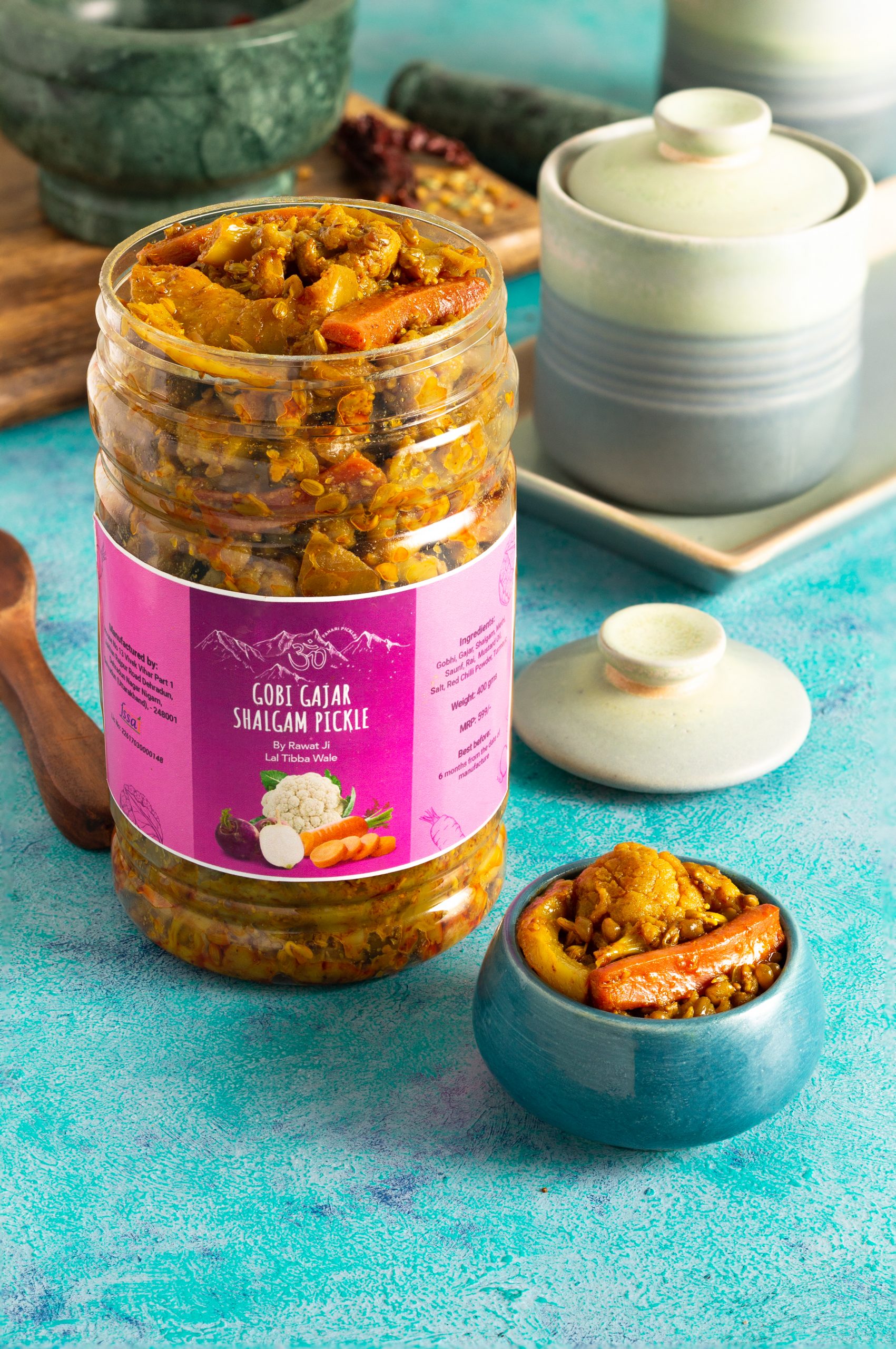
Carrots — crisp, sweet, earthy, and bright orange — are among the most loved vegetables globally. From school lunch boxes to gourmet kitchens, carrots feature prominently for good reason: they are loaded with essential vitamins that nourish your body in numerous ways.
But how much do we really know about what’s inside this humble root? Do carrots have Vitamin C? Are they a good source of Vitamin K? What other vitamins are in carrots? Let’s go beyond the basics and unlock the full power of carrot vitamins — their types, quantities, functions, and how best to consume them.
At Masala Monk, we believe in celebrating natural, nutrient-rich foods, and this post is your complete, evidence-based guide to the vitamins in carrots.
🧬 What Vitamins Are in Carrots?
Carrots are a low-calorie, high-fiber vegetable with a powerful vitamin profile. A single medium carrot (about 61g) delivers a wide spectrum of vitamins in modest but impactful amounts.
Here’s a breakdown of the key vitamins found in carrots:
| Vitamin | Amount (per 100g raw) | % Daily Value (DV) | Health Function |
|---|---|---|---|
| Vitamin A (from Beta-Carotene) | 835 µg RAE | 93% | Eye health, immunity, skin |
| Vitamin C | 5.9 mg | 7% | Immunity, collagen, antioxidant |
| Vitamin K1 | 13.2 µg | 11% | Blood clotting, bone strength |
| Vitamin B1 (Thiamine) | 0.066 mg | 6% | Energy metabolism, nerve function |
| Vitamin B6 (Pyridoxine) | 0.138 mg | 11% | Brain health, red blood cell production |
| Folate (Vitamin B9) | 19 µg | 5% | DNA synthesis, pregnancy health |
Let’s explore these in more detail.
🟧 Carrots and Vitamin A – The Beta-Carotene Superstar
If you associate carrots with better eyesight, you’re absolutely right. Carrots are best known for their very high Vitamin A content, primarily in the form of beta-carotene, a powerful antioxidant that the body converts into Vitamin A.
- Beta-carotene gives carrots their signature orange hue and is fat-soluble, meaning it’s best absorbed with healthy fats.
- One medium carrot can offer over 200% of your daily Vitamin A needs.
- Regular intake supports night vision, strengthens immune function, and promotes healthy skin.
This makes carrots an important food for preventing Vitamin A deficiency, particularly in regions where this is still a concern.
🍊 Vitamin C in Carrots – Is It Enough?
One of the most searched questions is: Do carrots have Vitamin C?
Yes, carrots do contain Vitamin C, though they are not the richest source compared to fruits like oranges or kiwis.
Still, carrots contribute a meaningful 5.9 mg of Vitamin C per 100g, around 7% of the daily recommended intake.
Why Vitamin C Matters:
- Acts as a potent antioxidant, protecting cells from oxidative damage.
- Essential for collagen synthesis, which supports skin, joints, and connective tissue.
- Improves iron absorption from plant-based sources — especially important in vegetarian diets.
- Boosts immune system function, helping your body fight infections.
At Masala Monk, we recommend combining carrots with other Vitamin C-rich ingredients in fresh juices or salads — think carrot and amla juice, or carrot and citrus salad — to get the best of both worlds.
🩸 Vitamin K in Carrots – A Bone and Blood Health Ally
Another common question is: Do carrots contain Vitamin K?
Absolutely — and this vitamin is often overlooked.
Carrots provide about 13.2 µg of Vitamin K1 per 100 grams, which covers approximately 11% of your daily needs.
Vitamin K1 (phylloquinone) is crucial for:
- Blood clotting: It helps produce the proteins necessary to stop bleeding after injury.
- Bone metabolism: It aids in calcium regulation and supports bone strength, especially when consumed alongside Vitamin D.
Many people mistakenly believe leafy greens are the only way to get Vitamin K. While spinach and kale are rich sources, carrots offer a valuable supplementary dose, especially when consumed regularly.
⚡ B-Complex Vitamins in Carrots – The Unsung Heroes
While carrots shine for their Vitamin A content, they also contain several important B vitamins — particularly Vitamin B1 (Thiamine), B6 (Pyridoxine), and Folate (Vitamin B9).
💡 Vitamin B1 – Energy and Brain Support
- Carrots contain 0.066 mg of Vitamin B1 per 100g, around 6% of the recommended daily intake.
- Thiamine supports energy production by helping the body metabolize carbohydrates.
- It plays a key role in nervous system function and brain health.
🧠 Vitamin B6 – Mood and Metabolism
- Vitamin B6 helps produce neurotransmitters like serotonin and dopamine.
- It supports hemoglobin production, impacting oxygen delivery throughout the body.
👶 Folate (Vitamin B9) – Essential for Life
- Folate is critical during pregnancy, as it supports neural tube development in babies.
- In adults, it contributes to DNA formation, cell repair, and heart health.
Together, these B vitamins enhance the body’s ability to generate energy, support cognitive function, and maintain a balanced mood — all in one delicious root.
🥗 How to Maximize the Vitamin Absorption from Carrots
Raw vs Cooked Carrots
- Raw carrots retain more Vitamin C, which is heat-sensitive.
- Cooking carrots enhances beta-carotene bioavailability, making more Vitamin A accessible to your body.
- Steaming is ideal — it softens the fibers without losing too many nutrients.
Combine with Fats
Since Vitamins A, K, and beta-carotene are fat-soluble, consume carrots with healthy fats like:
- Ghee (clarified butter) — a staple in Indian cooking
- Olive oil — great in salads and roasts
- Nuts and seeds — sprinkle over grated carrot for crunch
At Masala Monk, we love pairing carrots with traditional ingredients like mustard oil, sesame, or a drizzle of homemade nut butter to boost both flavor and nutrition.
🧃 Delicious Ways to Enjoy Carrots for Maximum Vitamin Intake
- Carrot Juice – Raw juice delivers Vitamin C and Folate with ease.
- Gajar Ka Halwa (Carrot Halwa) – When made with ghee and nuts, it becomes a beta-carotene-rich indulgence.
- Carrot Pickle (Gajar ka Achaar) – Preserves the goodness of carrots while adding probiotics.
- Carrot Soup – Cooked and blended carrots maximize Vitamin A absorption.
- Stir-Fried Carrot Sabzi – Traditional and nourishing when cooked lightly in spices and ghee.
Masala Monk’s community recipes offer several variations on these classics — always focused on taste and wellness.
🧾 Final Thoughts: Carrots Are More Than Just Vitamin A
In conclusion, carrots may be famous for their Vitamin A content, but they bring so much more to the table:
- They do contain Vitamin C, making them a helpful addition to your daily immune support.
- They are a moderate source of Vitamin K, supporting blood and bone health.
- They contribute important B-complex vitamins like B1, B6, and Folate, essential for energy, mood, and brain function.
Whether you’re eating them raw, cooked, juiced, or pickled, carrots are a powerful, affordable, and versatile source of essential nutrients. At Masala Monk, we celebrate the everyday ingredients that support extraordinary health — and carrots are a shining example.
🧠 10 FAQs About Vitamins in Carrots
1. Do carrots have Vitamin C?
Yes, carrots contain about 5.9 mg of Vitamin C per 100g, contributing around 7% of the daily recommended intake. While not as high as citrus fruits, they still support your immune system and antioxidant needs.
2. Are carrots a good source of Vitamin K?
Yes, carrots offer 13.2 µg of Vitamin K1 per 100g, which helps in blood clotting and bone health. They’re a beneficial addition to a balanced diet.
3. Which vitamin is found in the highest quantity in carrots?
Carrots are especially rich in Vitamin A, primarily in the form of beta-carotene. A single carrot can fulfill 200% or more of your daily Vitamin A needs, supporting eye health and immunity.
4. Do carrots contain B vitamins?
Yes, carrots provide Vitamin B1 (Thiamine), B6, and Folate (Vitamin B9) — essential for energy metabolism, nervous system function, and DNA synthesis.
5. How does cooking affect vitamin levels in carrots?
Vitamin C can degrade with heat, so raw carrots retain more of it. However, cooking increases the bioavailability of beta-carotene, enhancing Vitamin A absorption.
6. Are raw or cooked carrots healthier?
Both offer unique benefits. Raw carrots preserve Vitamin C and enzymes. Cooked carrots (especially steamed or lightly sautéed) provide more accessible beta-carotene.
7. Can I rely on carrots alone for my Vitamin A needs?
Yes, if eaten regularly. The beta-carotene in carrots converts efficiently to Vitamin A, making them a reliable source — especially when consumed with healthy fats.
8. Is carrot juice a good way to get vitamins?
Yes, fresh carrot juice is rich in Vitamin A and C, and is easy to digest. However, it lacks the fiber found in whole carrots.
9. How many carrots should I eat daily to benefit from these vitamins?
Eating 1–2 medium carrots per day is typically enough to reap significant Vitamin A benefits, while contributing to your Vitamin C, K, and B-vitamin intake.
10. Do colored carrots (purple, yellow, red) have the same vitamins?
Yes, all carrots provide a similar core of vitamins. However, purple carrots are higher in anthocyanins (antioxidants), and red carrots may contain more lycopene. The vitamin profile (A, C, K, B) remains largely consistent.










